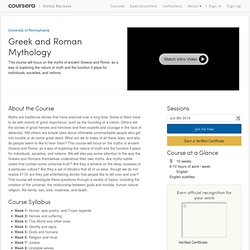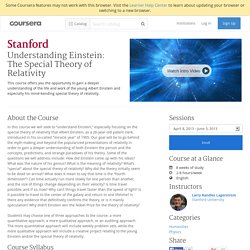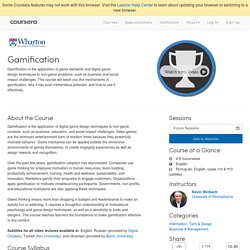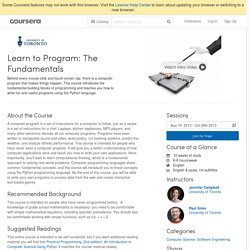

Introduction to Databases. Coursera. Greek and Roman Mythology. About the Course Myths are traditional stories that have endured over a long time.

Some of them have to do with events of great importance, such as the founding of a nation. Others tell the stories of great heroes and heroines and their exploits and courage in the face of adversity. Still others are simple tales about otherwise unremarkable people who get into trouble or do some great deed. What are we to make of all these tales, and why do people seem to like to hear them? Course Syllabus Week 1: Homer, epic poetry, and Trojan legends Week 2: Heroes and suffering Week 3: This World and other ones Week 4: Identity and signs Week 5: Gods and humans Week 6: Religion and ritual Week 7: Justice Week 8: Unstable selves Week 9: Writing myth in history Week 10: From myths to mythology Recommended Background No special background is needed other than the willingness and ability to synthesize complex texts and theoretical material.
In-course Textbooks Suggested Readings Greek Tragedies, Vol. The Hardware/Software Interface. An Introduction to Interactive Programming in Python. Understanding Einstein: The Special Theory of Relativity. About the Course In this course we will seek to “understand Einstein,” especially focusing on the special theory of relativity that Albert Einstein, as a 26-year-old patent clerk, introduced in his so-called “miracle year” of 1905.

Our goal will be to go behind the myth-making and beyond the popularized presentations of relativity in order to gain a deeper understanding of both Einstein the person and the concepts, predictions, and strange paradoxes of his theory. Some of the questions we will address include: How did Einstein come up with his ideas? What was the nature of his genius? What is the meaning of relativity? Students may choose one of three approaches to the course: a more quantitative approach, a more qualitative approach, or an auditing approach. Course Syllabus Week One (Einstein in Context): Einstein quotes of the week; a thought experiment involving relativity; physics and Einstein circa 1900. Week Six (Breaking the Spacetime Speed Limit?) Recommended Background. Gamification.
About the Course Gamification is the application of digital game design techniques to non-game contexts, such as business, education, and social impact challenges.

Video games are the dominant entertainment form of modern times because they powerfully motivate behavior. Game mechanics can be applied outside the immersive environments of games themselves, to create engaging experiences as well as assign rewards and recognition. Cryptography I. The Ancient Greeks. Know Thyself. Learn to Program: The Fundamentals. About the Course A computer program is a set of instructions for a computer to follow, just as a recipe is a set of instructions for a chef.

Laptops, kitchen appliances, MP3 players, and many other electronic devices all run computer programs. Programs have been written to manipulate sound and video, write poetry, run banking systems, predict the weather, and analyze athletic performance. This course is intended for people who have never seen a computer program.
It will give you a better understanding of how computer applications work and teach you how to write your own applications. Recommended Background This course is intended for people who have never programmed before. Suggested Readings This online course is intended to be self-contained, but if you want additional reading material you will find that Practical Programming (2nd edition): An Introduction to Computer Science Using Python 3 matches the course material closely. Course Format.
January 2014. October 2013. August 2013. September 2013. July 2013. June 2013. May 2013.